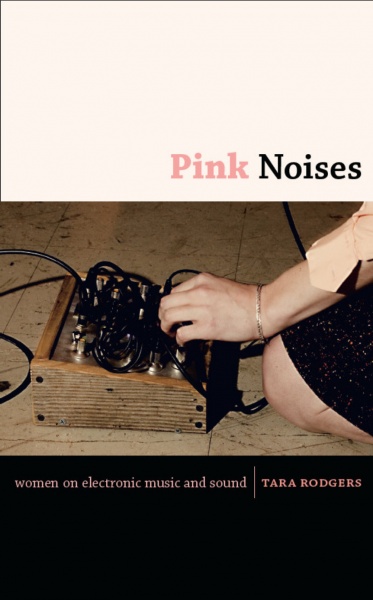Tara Rodgers: Pink Noises: Women on Electronic Music and Sound (2010)
Filed under book | Tags: · composing, electronic music, feminism, gender, music, performance, sound, sound art, technology, voice, women

Pink Noises brings together twenty-four interviews with women in electronic music and sound cultures, including club and radio DJs, remixers, composers, improvisers, instrument builders, and installation and performance artists. The collection is an extension of Pinknoises.com, the critically-acclaimed website founded by musician and scholar Tara Rodgers in 2000 to promote women in electronic music and make information about music production more accessible to women and girls. That site featured interviews that Rodgers conducted with women artists, exploring their personal histories, their creative methods, and the roles of gender in their work. This book offers new and lengthier interviews, a critical introduction, and resources for further research and technological engagement.
Contemporary electronic music practices are illuminated through the stories of women artists of different generations and cultural backgrounds. They include the creators of ambient soundscapes, “performance novels,” sound sculptures, and custom software, as well as the developer of the Deep Listening philosophy and the founders of the Liquid Sound Lounge radio show and the monthly Basement Bhangra parties in New York. These and many other artists open up about topics such as their conflicted relationships to formal music training and mainstream media representations of women in electronic music. They discuss using sound to work creatively with structures of time and space, and voice and language; challenge distinctions of nature and culture; question norms of technological practice; and balance their needs for productive solitude with collaboration and community. Whether designing and building modular synthesizers with analog circuits or performing with a wearable apparatus that translates muscle movements into electronic sound, these artists expand notions of who and what counts in matters of invention, production, and noisemaking. Pink Noises is a powerful testimony to the presence and vitality of women in electronic music cultures, and to the relevance of sound to feminist concerns.
Interviewees: Maria Chavez, Beth Coleman (M. Singe), Antye Greie (AGF), Jeannie Hopper, Bevin Kelley (Blevin Blectum), Christina Kubisch, Le Tigre, Annea Lockwood, Giulia Loli (DJ Mutamassik), Rekha Malhotra (DJ Rekha), Riz Maslen (Neotropic), Kaffe Matthews, Susan Morabito, Ikue Mori, Pauline Oliveros, Pamela Z, Chantal Passamonte (Mira Calix), Maggi Payne, Eliane Radigue, Jessica Rylan, Carla Scaletti, Laetitia Sonami, Bev Stanton (Arthur Loves Plastic), Keiko Uenishi (o.blaat)
Publisher Duke University Press, 2010
ISBN 0822346737, 9780822346739
322 pages
Review (Tiffany Naiman, Ethnomusicology Review)
Review (Mary Simoni, Computer Music Journal)
Review (Betsey Biggs, Women and Music: A Journal of Gender and Culture)
Download (removed on 2013-12-13 upon request of the publisher)
View online (partial version, HTML, added on 2014-1-14)
Wolfgang Ernst: Digital Memory and the Archive (2012)
Filed under book | Tags: · archive, art, communication, computing, culture, data, history, information, internet, knowledge, machine, media, media archeology, media studies, media theory, memory, photography, radio, sound, storage, technology, television, temporality, time

“In the popular imagination, archives are remote, largely obsolete institutions: either antiquated, inevitably dusty libraries or sinister repositories of personal secrets maintained by police states. Yet the archive is now a ubiquitous feature of digital life. Rather than being deleted, e-mails and other computer files are archived. Media software and cloud storage allow for the instantaneous cataloging and preservation of data, from music, photographs, and videos to personal information gathered by social media sites.
In this digital landscape, the archival-oriented media theories of Wolfgang Ernst are particularly relevant. Digital Memory and the Archive, the first English-language collection of the German media theorist’s work, brings together essays that present Ernst’s controversial materialist approach to media theory and history. His insights are central to the emerging field of media archaeology, which uncovers the role of specific technologies and mechanisms, rather than content, in shaping contemporary culture and society.
Ernst’s interrelated ideas on the archive, machine time and microtemporality, and the new regimes of memory offer a new perspective on both current digital culture and the infrastructure of media historical knowledge. For Ernst, different forms of media systems—from library catalogs to sound recordings—have influenced the content and understanding of the archive and other institutions of memory. At the same time, digital archiving has become a contested site that is highly resistant to curation, thus complicating the creation and preservation of cultural memory and history. ”
Edited and with an Introduction by Jussi Parikka
Publisher University of Minnesota Press, 2012
Volume 39 of Electronic Mediations
ISBN 0816677670, 9780816677672
265 pages
Reviews: Liam Cole Young (Reviews in Cultural Theory, 2013), Peter Ward (Information & Culture, 2014).
PDF (updated on 2025-12-9)
For more from Wolfgang Ernst see Monoskop wiki.
Comment (0)Arndt Niebisch: Media Parasites in the Early Avant-Garde: On the Abuse of Technology and Communication (2012)
Filed under book | Tags: · art history, avant-garde, dada, futurism, mass media, media ecology, networks, noise, parasite, performance, poetry, radio, sound, subversion, technology

“The avant-garde movements of the early twentieth century inhabited the media discourses of their time like parasites, constantly irritating and taking from them. Dadaists ripped images of a mechanically reproduced world out of newspapers and magazines and reassembled them in their collages. Futurists instrumentalized the brevity of telegraph messages for their free word poetics. Artists such as F.T. Marinetti, Raoul Hausmann and Luigi Russolo constantly abused existing media technologies and hijacked public communication. This study traces these subversive tactics from avant-garde poetry to media technological experiments with radio tubes.”
Publisher Palgrave Macmillan, 2012
Avant-Gardes in Performance series
ISBN 1137276851, 9781137276858
250 pages
PDF, PDF (updated on 2016-3-15)
Comments (3)
